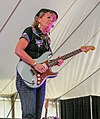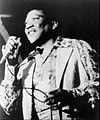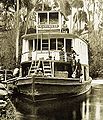Portal:Blues
The Blues Portal

Blues is a music genre and musical form that originated in the Deep South of the United States around the 1860s. Blues incorporated spirituals, work songs, field hollers, shouts, chants, and rhymed simple narrative ballads from the African-American culture. The blues form is ubiquitous in jazz, rhythm and blues, and rock and roll, and is characterized by the call-and-response pattern, the blues scale, and specific chord progressions, of which the twelve-bar blues is the most common. Blue notes (or "worried notes"), usually thirds, fifths or sevenths flattened in pitch, are also an essential part of the sound. Blues shuffles or walking bass reinforce the trance-like rhythm and form a repetitive effect known as the groove.
"The Blues" is characterized by its lyrics, bass lines, and instrumentation. Early traditional blues verses consisted of a single line repeated four times. It was only in the first decades of the 20th century that the most common current structure became standard: the AAB pattern, consisting of a line sung over the four first bars, its repetition over the next four, and then a longer concluding line over the last bars. Early blues frequently took the form of a loose narrative, often relating the racial discrimination and other challenges experienced by African-Americans.
Many elements, such as the call-and-response format and the use of blue notes, can be traced back to the music of Africa. The origins of the blues are also closely related to the religious music of the Afro-American community, the spirituals. The first appearance of the blues is often dated to after the ending of slavery. Later, the development of juke joints. It is associated with the newly acquired freedom of the former slaves. Chroniclers began to report about blues music at the dawn of the 20th century. The first publication of blues sheet music was in 1908. Blues has since evolved from unaccompanied vocal music and oral traditions of slaves into a wide variety of styles and subgenres. Blues subgenres include country blues, Delta blues and Piedmont blues, as well as urban blues styles such as Chicago blues and West Coast blues. World War II marked the transition from acoustic to electric blues and the progressive opening of blues music to a wider audience, especially white listeners. In the 1960s and 1970s, a hybrid form called blues rock developed, which blended blues styles with rock music. (Full article...)
Selected article -

The Mississippi Delta, also known as the Yazoo–Mississippi Delta, or simply the Delta, is the distinctive northwest section of the U.S. state of Mississippi (and portions of Arkansas and Louisiana) that lies between the Mississippi and Yazoo rivers. The region has been called "The Most Southern Place on Earth" ("Southern" in the sense of "characteristic of its region, the American South"), because of its unique racial, cultural, and economic history. It is 200 miles (320 km) long and 87 miles (140 km) across at its widest point, encompassing about 4,415,000 acres (17,870 km2), or, almost 7,000 square miles of alluvial floodplain. Originally covered in hardwood forest across the bottomlands, it was developed as one of the richest cotton-growing areas in the nation before the American Civil War (1861–1865). The region attracted many speculators who developed land along the riverfronts for cotton plantations; they became wealthy planters dependent on the labor of people they enslaved, who composed the vast majority of the population in these counties well before the Civil War, often twice the number of whites.
As the riverfront areas were developed first and railroads were slow to be constructed, most of the bottomlands in the Delta were undeveloped, even after the Civil War. Both Black and White migrants flowed into Mississippi, using their labor to clear land and sell timber in order to buy land. By the end of the 19th century, black farmers made up two-thirds of the independent farmers in the Mississippi Delta. (Full article...)Selected picture
Quotes
| “ | Blues is really America's finest art form and most dominant art form of the 20th century. | ” |
| — Georgie Fame | ||
| “ | Blues is a natural fact, something that a fellow lives. If you don't live it, you don't have it. | ” |
| — Big Bill Broonzy | ||
| “ | The blues is a low-down achin' heart disease Like consumption killing me by degrees. |
” |
| — Robert Johnson, "Preaching Blues (Up Jumped the Devil)" | ||
| “ | When you lay down at night, turning from one side of the bed to the other and can't sleep, what's the matter? Blues got you. | ” |
| — Lead Belly | ||
| “ | The blues had a baby and they named it rock and roll. | ” |
| — Muddy Waters | ||
Selected biography -
General images -
Things to do
Tasks template
 |
Here are some tasks awaiting attention:
|
- –When a task is completed, please remove it from the list.
WikiProjects
Categories
Related portals
Wikimedia
The following Wikimedia Foundation sister projects provide more on this subject:
-
Commons
Free media repository -
Wikibooks
Free textbooks and manuals -
Wikidata
Free knowledge base -
Wikinews
Free-content news -
Wikiquote
Collection of quotations -
Wikisource
Free-content library -
Wikispecies
Directory of species -
Wikiversity
Free learning tools -
Wikivoyage
Free travel guide -
Wiktionary
Dictionary and thesaurus






































































































